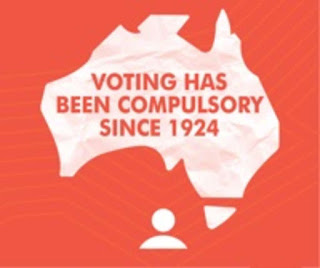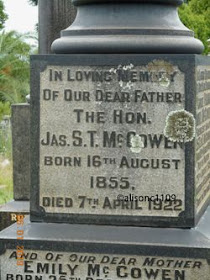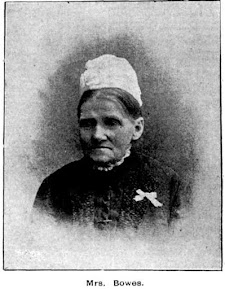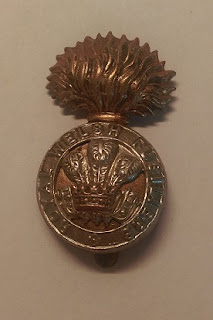An Odium of Politicians!
I guess we are glad that we can see election day in sight after a long six week campaign....
Image from the Museum of Democracy at Old Parliament House
With all this political talk it got me thinking about the Politicians who call Rookwood home.
Throughout the Cemetery there would be thousands of people who took up the baton to effect change. Many Aldermen, Mayors, Members of the State Government of NSW and a smattering of those who represented the Nation are buried in the Necropolis particularly in the original 200 acres where it seemed many a businessman found his way to Council Chambers and then onto the State Government representing his electorate. Many were cremated and their ashes scattered in the Necropolis.
Of the Politicians most are from the Left leaning variety befitting the area in which they lie, being mainly working class. There are a number of prominent woman as well.
So to a little name dropping and we have John "Jack" Lang, Fred Daly, Sydney (Sid) Einfeld, Alexander Kethel, Hugh de Largie - Western Australia Senator; Mervyn Ferguson, Patrick Minahan, Annie Stanley, etc etc but today I will shine the light on a forgotten man and woman who made a difference.
Ladies first as they say..
(ELIZABETH) LILIAN FOWLER
Lilian, as she liked to be known, was born at Cooma, NSW in 1886; the third daughter of farmer Charles and Frances Gill. She seemed destined for politics from an early age. It is said that she decided on a career in politics after an ‘Inspector for Nuisances’ confiscated her marbles while she was playing with them on a public footpath but it is more likely that she gained an interest in politics from her father, a Labor League organiser and alderman for Cooma Municipal Council. On 19 April 1909, while working as a waitress in Sydney, she married bootmaker Albert Edward Fowler, a widower, at Whitefield Congregational Church.
Painting of Lillian in official robes - Wikipedia
Lilian Fowler showed an interest in local affairs and was made Secretary of the Newtown-Erskineville Political Labor League. From 1917 she managed the electorate of Newtown MP, Frank Burke, an anti-conscriptionist.
Elected to the central executive of the Australian Labor Party 1920–21 and 1923–25, she was instrumental in the anti-corruption moves at the conference which led to the exposure of sliding-panel ballot boxes.
Lilian was President of the Labor Women's Central Organising Committee 1926–27, lobbying NSW Premier Jack Lang to implement widows' pensions and child endowments. She also petitioned the governor regarding the appointment of women to the Legislative Council, and organised the first interstate Labor Women's conference.
One of the first women to be appointed Justice of the Peace, she was elected to Newtown Municipal Council in 1928 and was the first woman elected to any local council in New South Wales.
She held office sporadically after that point (1935–37, 1938–40, 1941–44, 1948), but on 7 December 1937 became Australia's first female mayor, holding the mayoralty until 1939.
In 1941, Fowler unsuccessfully ran against Frank Burke for the seat of Newtown as an independent Labor candidate. She ran again as a Lang Labor candidate in 1944, campaigning for reduced taxation, better housing and more day nurseries and baby clinics, and defeating Burke to become the third woman elected to the New South Wales Legislative Assembly since its inception in 1856.
She ceased to be an Alderman in 1948 when Newtown was absorbed into the City of Sydney; in 1950 she was defeated at the State elections and she was unsuccessful in the 1953 elections for Sydney Municipal Council.
Survived by a daughter, Fowler died on 11 May 1954 in King George V Memorial Hospital from a coronary arterial blockage and was buried with Methodist rites at Rookwood.
Image from "Find a Grave" with thanks
Lilian Fowler was a formidable woman whose clarity of convictions, confidence and outstanding organisational skills helped her gain the highest position for a woman in local politics at the time. She opened up opportunities for women while helping the most marginalised people in society.
Her name lives on in the Lilian Fowler Reserve in Newtown and the Federal Division of Fowler which is named after her.
JAMES SINCLAIR McGOWAN
James was the son of James McGowan, a boilermaker, and his wife Eliza, immigrants from Lancashire, England and was born at sea, aboard the "Western Bride" whilst on the way to Melbourne in 1855. James Senior had emigrated to work for the Victorian Government on bridges in the State and later in NSW.
Image of James Sinclair McGowan from Wikipedia
After limited schooling, McGowan was apprenticed as a boiler maker in 1870 and became a member of the United Society of Boilermakers and Iron Shipbuilders of NSW upon it's establishment in 1873 and was elected to Secretary the following year. He entered the Railways Department and 1888 was elected President of the Executive of the Trades Hall Committee. McGowan worked tirelessly to raise funds for the Trades Hall in Sydney.
In 1891, the NSW Trades and Labour Council established the Labor Electoral League which developed into the Australian Labor Party and McGowan stood for election to the NSW Legislative Assembly seat of Redfern. He was one of 35 Labor candidates to win and the most experienced unionist. He held the seat continuously until 1917.
As a result of his skillfulness as a Parliamentarian and seniority he became the Party's Parliamentary Leader in 1894. McGowan's honesty and good judgement were reassuring to the public and were a major faction in Labor's 1910 election win. While he was Premier of NSW from 1910 to 1913, he left a lot of the hard work to his Deputy, William Holman. Whilst Holman was in England in 1913, McGowan attempted to settle a gas worker's strike by threatening to replace them with non-union labour. This alienated the Party and Holman deposed McGowan as Leader upon his return in June 1913. McGowan remained in the Party and took up the office of the Minister for Labour and Industry until January 1914.
However, under his guidance as Premier, improved low-cost medical services were made widely available throughout NSW. In addition public works were expanded, important educations reforms were enacted, together with reforms in electoral law, income tax, arbitration and housing for workers.
Three of his sons served in WW1 where one was killed at Gallipoli in 1915 and he was a strong supporter of Australia's involvement in the War. The 1916 Labor Conference decided to oppose conscription. McGowan disagreed and was expelled along with most of the Parliamentary Party. At the 1917 election he was defeated by the official Labor candidate, William McKell, but Premier Holman appointed him to the then unelected Legislative Council in July of that year.
James Sinclair McGowan died of heart disease at his home in Petersham in April 1922, survived by his wife, five of their seven sons and two daughters. His wife, Emily, died within six weeks of his death.
Image of Grave inscription from Find a Grave - with thanks
McGowan's funeral was largely attended and there was an approach made to the acting Premier John (Jack) Lang to afford the Labor Party's first Premier a State Funeral but this request was declined as it was felt that it would not be the correct thing for the outgoing Government to create a precedent. He and his wife lie in a plot with a suitably large monument in the Anglican area in Zone D.
To find out more of both of these pioneering Politicians and of the others listed earlier, a simple google search will bring up a wealth of information in most cases via the Australian Dictionary of Biography or a Wikipedia entry.
If you wish to comment on this blog and are unable to, simply go to facebook and search for rookwoodcemeterydiscoveries and place your comment or question there. You are also welcome to send me a facebook message.








Comments
Post a Comment